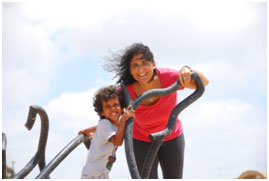
We also like to think that we are better at parenting than our own parents. We often don’t notice how we use the exact same parenting styles we hated in them. To our credit, we sometimes manage to make small changes and this makes us think that we are better than them. We can do something they couldn’t. We think that the harder it was to make the changes, the better we are. This is not always true. In fact, the damage from our choices can be as bad for our own children as it was for us (or even worse).
This is a very hard concept for parents to understand. Kids see things completely differently. If your dad beat you with a belt or hot iron and you only use your hands to beat your own children, it is not very effective to tell your kids that you had it worse and that you are better than your own dad. When you hurt your kids, they can’t really be all “Pollyanna” about it (Pollyanna was a girl who always found the positive side of everything).
Pain is an interesting thing. It can be divided into physical pain and emotional pain. Some parents think changing their parenting style from using physical pain to emotional pain makes them a better parent. These parents don’t understand the dynamics of pain. Emotional pain is just as bad as physical pain. In fact, the real pain behind physical pain is the emotional echo of insult, shame and abuse. Remember the song, “Sticks and stones will break my bones but words will never hurt me”? Unfortunately, words do hurt. Emotionally violent parents are no better, and sometimes worse than those who are physically violent.
Self-justifying our parenting style

We do exactly the same thing with our parenting styles. If our parents provide an example of good parenting, we try to justify it by noticing the things that “prove” that they were good parents (e.g. how well we did in school, how well behaved we were as children, how successful we are as adults). We then adopt this parenting style and continue to justify it, noticing the things in our own children that support the idea that we are good parents. This is fantastic if you had a good example, but if our parents show us a bad example of parenting, we justify that as well.
Justifying happens most when we talk to others. In fact, when we talk to others about our parenting, we are using them to justify what we already think or believe. It doesn’t matter if they try to point out what really happened or ask why we did what we did. Any question will be justified.
For many parents, this realization is very scary. How can we change if we justify what we already think and believe anyway?
The truth is, we can’t. We have to find another strategy to make that change. We must look inside rather than outside. There is a little bit more honesty there.
Justifying anchors and improving ourselves

If parenting were a ship sailing in the sea, every time we justify, it is like throwing down another anchor. Moving from that spot becomes harder and harder.
This “justifying” mode is strongest when we feel unsafe or when we are under threat. This is a very natural instinct. In the past, this instinct kicked in when we were under physical threat – facing a lion or a snake. Today’s lions and snakes come from within.
Better parenting with awareness
There is one situation where we can turn off this “justifying” mode. When we are self-aware, and there is no external pressure from the world around us. When we feel safe, we can muster up the courage to make up our own minds. Rather than letting our parents’ parenting style choose us, we allow ourselves the freedom to choose the style that will fit best with who we are, who our kids are and what our life circumstance are like. There is no one size fits all. There is no “right way” to be a parent. We should aim, not to be better than our parents, but to be better than ourselves.
Being better than our own parents is not an ideal. We started being parents almost 30 years after them. We live in two different eras with different circumstances and social morals. Putting 5 year olds to work in factories seemed appropriate to some parents in the past. Today, this would be considered slavery. Selling girls to their husbands for the price of a cow or goats was appropriate in the past. Today, not so much. The same parenting styles of the past do not fit today. Parents back then accepted the social morals of their times. And we are doing the same today. We simply accept social morals and spend all our energy justifying the weaknesses in these approaches.
The only way to change this is through internal conversation. This is the only conversation we have with ourselves and be absolutely honest with ourselves, without triggering any lions and snakes or feeling threatened. Self-reflection is the next step is the start of this “bettering” process. Reflect on your own upbringing and your parents’ parenting. Evaluate what you appreciated about your parents and what wasn’t so great. This is essential to becoming a better parent.
Don’t justify their behavior (none of the: “They were hard times”, or “everyone did it like that in those days”). Just think about how their parenting impacted you and keep asking yourself, “What can I do to make me better?” Focus on the good things you can learn from your own parents (because every parent has something good to give). If too many bad things pop up in your reflection, forgive them and focus on what you can learn to make your parenting different.

If things aren’t going so well with your kids, families or relationships, turn on your “reflective” mode. There is a bit more honesty and courage there. This can be hard to do. Old habits die hard. Find someone to talk to, someone you don’t have to impress or justify your choices to. This can be a good friend whose parenting style you appreciate, your child’s teacher or a life coach. Try never to do this with your own kids.
Being better than your own parent is not the ideal. Turn off your “justifying” mode. Be a better parent, by being a better you.
Happy parenting,
Ronit











